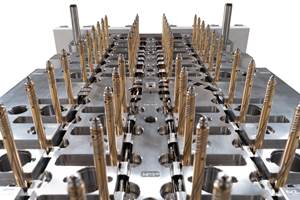Real-World Experience Guides Machine Development
For this German machine tool builder, operating a robust contract manufacturing business helps inform the development of both new technology and solutions to customers’ individual production issues.
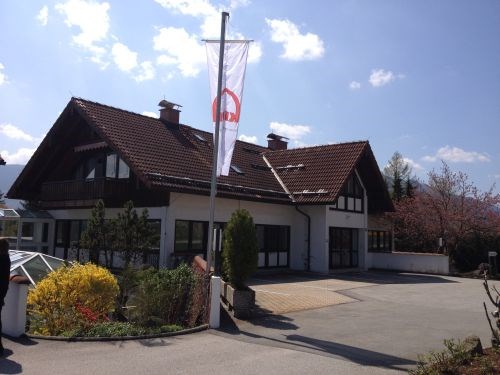
Nestled among the Alpine foothills in Bavaria, southern Germany, the building depicted above looks more like a home or a ski lodge than an advanced manufacturing plant. In fact, it’s the primary production facility of a company that claims to be Europe’s largest supplier of micro parts (loosely defined as those measuring less than 50 square mm). Although the components machined here are small, the facility’s outward appearance belies its size. Production occurs mostly underground on machinery that’s capable of achieving tolerances measured not in millimeters, but in microns.
Notably, the majority of that machinery was manufactured at this very same plant. The company, Kern Microtechnik, isn’t just a producer of discrete parts. It’s also a machine tool builder—a machine tool builder that’s ready and eager to apply its manufacturing expertise toward making further inroads with you, the U.S. mold manufacturer.
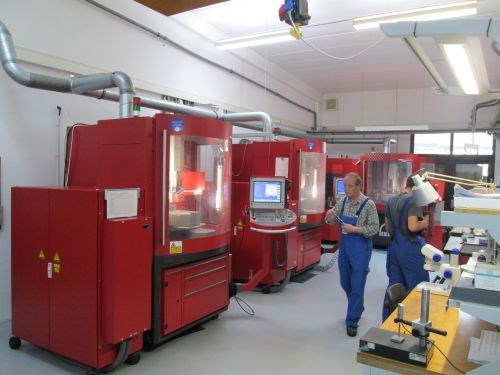
The company’s Marnau location is dedicated not just to building its own machines, but using those same machines to produce customer parts.
This focus on the U.S. mold and die sector is evidenced by more than just the invitation of MoldMaking Technology to the company’s April 23-24 “Precision Days” open house event. Recent years have seen European mold manufacturers purchase Kern machines in increasing numbers, and the company hopes to duplicate that success here in the States. So says Toni Mangold, who recently moved from Murnau to Webster, Massachusetts to serve as sales director for U.S. arm Kern Precision. Beyond personnel shifts, the operation recently expanded its U.S. presence through a partnership with Michigan-based machine tool supplier Merrifield Machinery Solutions.
Like those in Europe, U.S. mold shops potentially have much to gain from technology informed by real-world experience in manufacturing some of the most intricate parts on the globe, Mangold says. The company’s experiences with its own machines in actual contract applications, which account for 80 percent of the Murnau plant’s business, better prepares it to help other users with their own production challenges, he explains. Likewise, lessons learned in contract manufacturing help engineers design better machines at the headquarters and assembly facility in nearby Eschenlohe.
The company’s most precise machine is the Pyramid Nano, which features hydrostatic drives and guides in all linear axes. This model is an ideal fit for shops with a niche in parts that with exceptionally stringent accuracy and surface finish requirements, Mangold says.
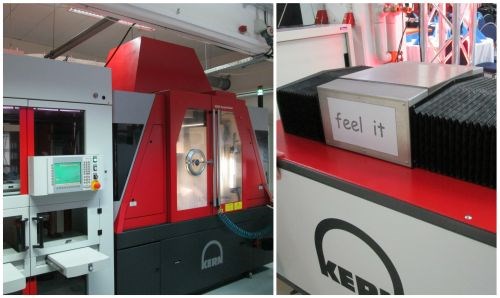
The Pyramid Nano, shown on the left cutting hard ceramic dental implants at the contract manufacturing operation in Murnau, incorporates all hydrostatic axes. The company invited attendees to “feel” the benefits for themselves with the functional model of the axis structure on the right.
However, he says the latest offering, the Kern Micro, is more accessible for the vast majority of even the most demanding mold manufacturing applications. Building on the success of the earlier Evo model, the Micro’s positional accuracy of +/- 0.5 µm in both three- and five-axis configurations places it firmly within the company’s historical niche: Complex, intricate machining to extremely tight tolerances.
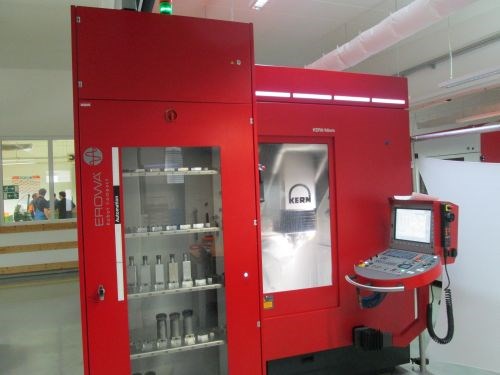
The Micro in this shot is set up with an Erowa robot compact for a particularly challenging application: completely unattended production of customer parts made from material that’s 23-percent cobalt. The machine’s temperature stability, CBN cutting tools and in-machine laser from Blum are just a few critical aspects of manufacturing these parts effectively, not to mention careful process engineering.
Although the Micro was the machine I focused on most during my time at Kern, the machine’s broad moldmaking appeal wasn’t the only reason. For me at least, the design concepts behind the machine’s flexibility and precision seemed just as noteworthy as its raw capability. Highlights include an aluminum axis structure, a different type of travel system, a proprietary temperature-control concept, and a particularly versatile toolchanger design, all of which are covered in more detail here.
Related Content
How to Solve Hot Runner Challenges When Molding with Bioresins
A review of the considerations and adaptations required to design hot runners and implement highly productive injection molding operations.
Read MoreConfronting the Mold Design Talent Drought
Recently, I reposted on LinkedIn the results of an informal survey we conducted, which revealed a shortage of skilled mold designers. It quickly gained a lot of traction. Given the response, I thought I'd summarize the feedback and keep the conversation going.
Read MoreThe Role of Social Media in Manufacturing
Charles Daniels CFO of Wepco Plastics shares insights on the role of social media in manufacturing, how to improve the “business” side of a small mold shop and continually developing culture.
Read MoreDynamic Tool Corporation – Creating the Team to Move Moldmaking Into the Future
For 40+ years, Dynamic Tool Corp. has offered precision tooling, emphasizing education, mentoring and innovation. The company is committed to excellence, integrity, safety and customer service, as well as inspiring growth and quality in manufacturing.
Read MoreRead Next
How to Use Continuing Education to Remain Competitive in Moldmaking
Continued training helps moldmakers make tooling decisions and properly use the latest cutting tool to efficiently machine high-quality molds.
Read MoreAre You a Moldmaker Considering 3D Printing? Consider the 3D Printing Workshop at NPE2024
Presentations will cover 3D printing for mold tooling, material innovation, product development, bridge production and full-scale, high-volume additive manufacturing.
Read MoreReasons to Use Fiber Lasers for Mold Cleaning
Fiber lasers offer a simplicity, speed, control and portability, minimizing mold cleaning risks.
Read More















